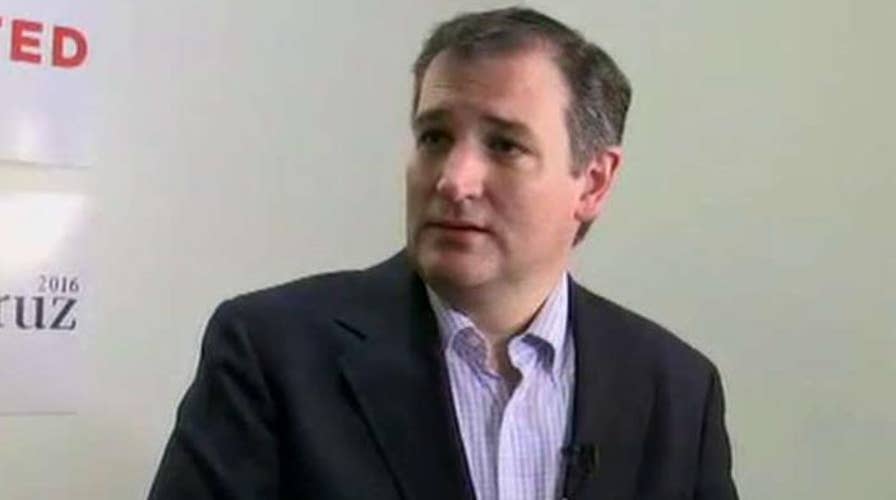Cruz: Head-to-head, I beat Donald Trump
Republican presidential candidate urges rivals to assess the viability of their campaigns
After Super Tuesday and Thursday’s candidate brawl at the 11th GOP presidential debate, let’s call this latest experiment in democracy “Stop-by Saturday” – four states in the northeast, southeast and Midwest holding GOP primaries and caucuses.
A very big vote awaits the four remaining Republican candidates Tuesday in Michigan, followed a week later by winner-take-all primaries in Florida and Ohio. The field may be down to just two candidates after that.
Still, what transpired Saturday in Kansas, Kentucky, Louisiana and Maine mattered for these four reasons:
1. Trump’s Fertile(?) Ground. One thing we’ve learned about Donald Trump and his flying circus: there are plenty of states amenable to his message of economic frustration and rage against the political machine.
That includes Maine, which caucused on Saturday – and, going into Saturday, was presumably Trump Territory.
After years of economic decline in the form of a shrinking manufacturing base, Down Easterners now face the question of whether to encourage immigration to meet growing employment demands.
Twice in the last six years, the state’s chosen the bombastic Paul LePage as its governor. He has a Chris Christie-like style of bully politics and a Trump-like way with political incorrectness (for example, earlier this year blaming Maine’s heroin epidemic on “guys by the name D-Money, Smoothie, Shifty”).
The point: the seeds for Trump’s success may have sown well before he plowed the 2016 field.
However, in Maine, Trump came a cropper (though he did claim Kentucky and Louisiana, for a split decision on the night). Credit Texas Sen. Ted Cruz with out-organizing Trump in yet another small, rural-tinged caucus.
But with primaries now taking over from caucuses, are these latest returns a sign of coming attractions or just a bad stretch of road for the Trump Express?
2. Trump’s a Frontrunner, but not a Conservative Favorite. All four states on Saturday had closed primaries or caucuses, which meant that only Republicans were eligible to vote (in Maine, independents could do same-day GOP registration; otherwise, voters had to come over to the Republican side weeks before the polls opened).
Before Saturday, Trump had dominated in a February and Super Tuesday heavy with states employing “open” voting rules. Iowa, Nevada, Alaska and Oklahoma were the only closed affairs – Trump’s batted one-for-four (you can expect talk about frontloading more closed primaries and minimizing if not eliminating open primaries when the GOP turns to 2020 planning).
This made Kansas, in particular, worth watching as both Trump and Cruz worked the state hard immediately after Super Tuesday.
Going into the Jayhawk caucuses, this Trafalgar Group poll had Trump up by 6 points over Texas Sen. Ted Cruz (35.2percent-29.3 percent), with Florida Sen. Marco Rubio a distant third (16.6 percent).
Saturday’s results: Cruz 48percent, Trump 23 percent.
Granted, Stop-by-Saturday polling was scarce, but this time the swollen turnout (in Kansas it was up by 50 percent over 2012), absent Democratic and independent crossovers, didn’t break Trump’s way.
Between Trump’s setbacks in Kansas and Maine and Cruz’s victory in the CPAC straw poll, we seem to have a paradox: the Republican frontrunner is not a conservative favorite.
3. The Delegate Math. The four states offered a combined 155 delegates – that’s the same exact number as Texas, 10 fewer than Florida/Ohio and 17 fewer than California. Moving forward, fewer than 1,600 of the GOP’s 2,474 delegates are still up for grabs.
Saturday’s results aren’t a game-changer, but they do factor into a Trump march to the nomination that’s long or short depending on the candidate’s ability to gobble up winner-take-all states and increase his delegate share in proportional outcomes (that may increase if it’s just Trump and Cruz going at it).
And there’s one other GOP convention equation. Which would be . . .
4. Adding Up To Eight. The other reason why Kansas and Maine mattered for Cruz: the GOP rule that only candidates with a majority of delegates in a minimum of eight states can qualify for the convention’s nominating ballot (the party can always change this before the nominating begins, but to do so would be contentious – if not downright ugly).
Cruz now has six such states. The better question, how the math adds up for Rubio and Ohio Gov. John Kasich.
If Rubio wins Florida, that brings his total to two states (he won Minnesota on Super Tuesday). If Kasich carries his home state, that brings his total to…one.
How does either candidate get to eight, given that only 19 states remain after March 15?
That’s not the only question after Saturday’s vote. Here are four more:
- Will this soon be a two-man race between Trump and Cruz?
- Does that improve or harm Trump’s chance of a first-ballot win in Cleveland?
- Do Rubio and/or Kasich find redemption on their home turf?
- The more Republicans flail about, is Hillary Clinton suddenly living a charmed political existence?
On a Saturday night like March 5, when the race takes yet another odd twist, those answers still seem far away.

